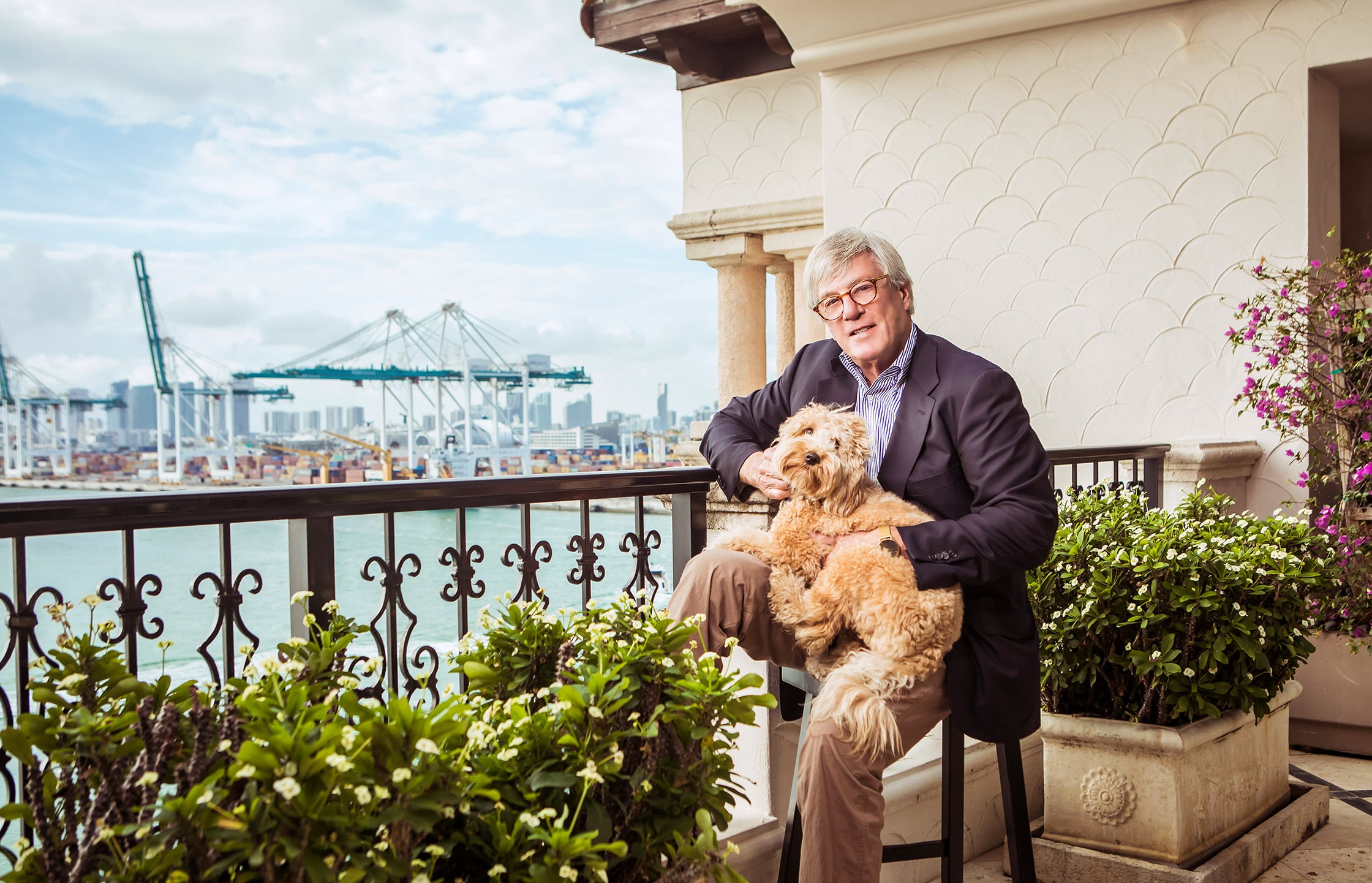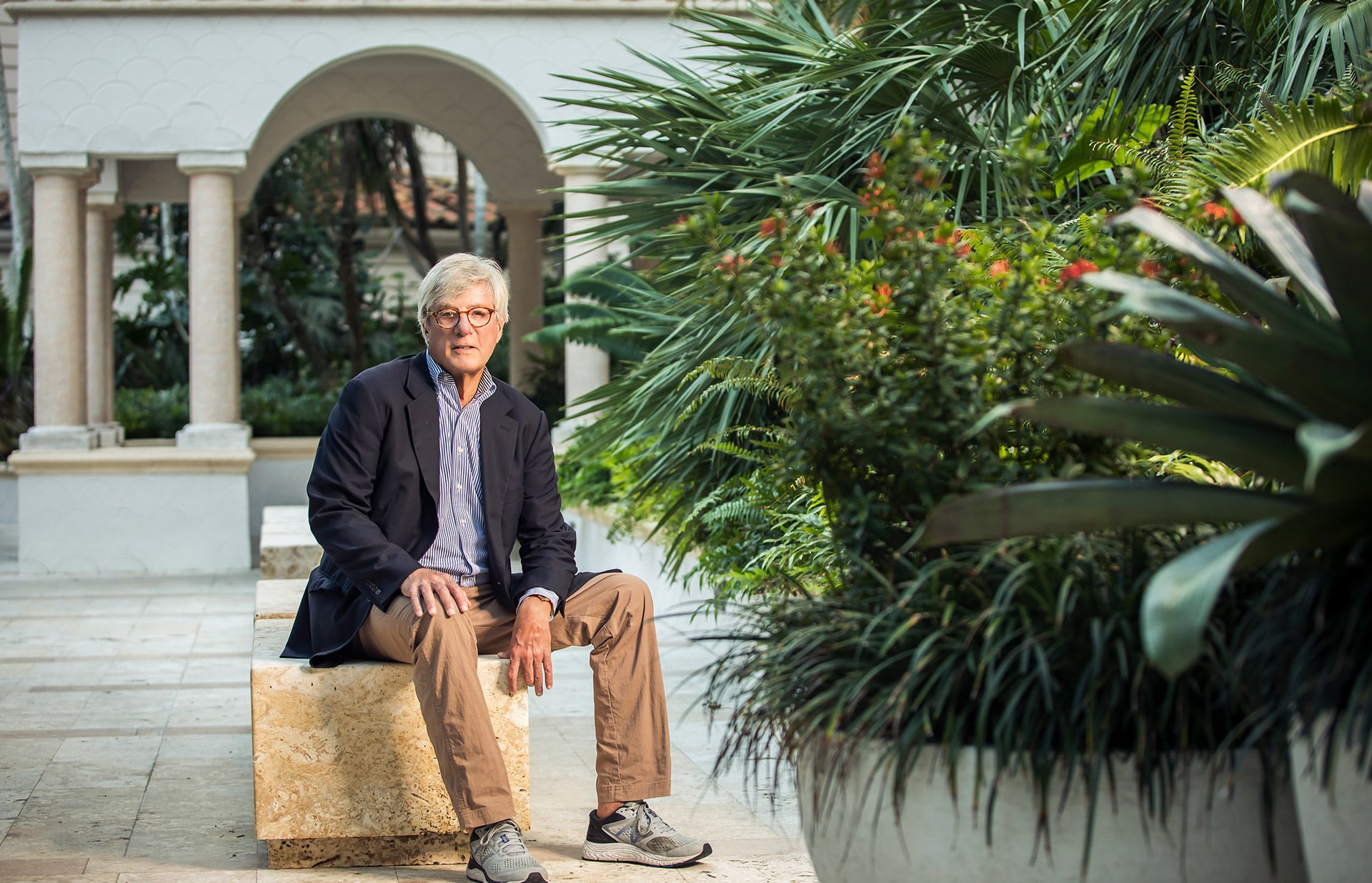In Times of Crisis, a Focus on Immediate Impact
Spurred on by his friend’s memory, donor supports a new vaccine and rapid test to fight COVID-19.
By Elaine Zeinner
Photography by Sonya Revell

William Strong
W
illiam Strong watched the COVID-19 pandemic unfold in Wuhan, China last winter and knew it was only a matter of time before the virus made its way to the United States.
“It was clear it was coming here and that it was going to be a very big deal,” Strong said.
The value investor and global hedge fund manager did what he often does in a crisis. He turned to his network to find organizations in need of financial support – organizations that could quickly deploy funds to ease the strain caused by COVID-19.
He chose to support two organizations he already had strong ties with, including the University of Miami Leonard M. Miller School of Medicine.
“Hospitals were desperate everywhere as they faced equipment and personnel shortages and struggled to fight a virus we didn’t know very much about,” recalled Strong. “I was fortunate to have the ability to act quickly and give funds to help.”
Strong recognizes the importance of acting – and donating – in the immediate aftermath of disaster. The Indian Ocean earthquake and tsunami in 2004 spurred Strong to organize a $1 million donation from himself and his partners in the Asia hedge fund he managed. That gift went to the Red Cross just days after that terrible tragedy decimated entire regions along the Sumatra coastline – and beyond.
“Wealthy individuals have the unique capacity to move quickly to support reputable organizations that are ‘on the ground’ during times of crisis,” he shared. “To share my resources with people I know can and will make a difference with their response – whether that’s working to develop and deploy COVID-19 testing or get desperately needed resources in the hands of people recovering from a natural disaster; it’s the least I can do.”
In the case of COVID-19, Strong’s support has helped important initiatives at the Miller School, including the development of a rapid COVID-19 test, which is undergoing clinical studies.
The rapid test in development at the Miller School has been shown to be as effective as the “gold standard” polymerase chain reaction (PCR) COVID-19 tests and can detect infection much earlier than rapid tests already on the market. And because it requires no special medical instruments, the new test can be completed in about 30 minutes at any point of care, including airports or cruise ship terminals.
Strong’s support of the Miller School’s rapid test work has sped the commercialization process. A patent for the test was issued in record, three-month time and licensing negotiations with a biotech company are currently underway.
“We are extremely grateful to Mr. Strong as he was there for us to boost our efforts and allow us to move forward with the development of the technology when federal funds were not available,” said Sylvia Daunert, Pharm.D., M.S., Ph.D., chair of the Department of Biochemistry and Molecular Biology and director of the Dr. John T. Macdonald Foundation Biomedical Nanotechnology Institute. “It is paramount to recognize that it is the generosity of kind and visionary philanthropists like Mr. Strong that is critical in supporting science and technology, not only in emergency situations like the pandemic, but throughout the 21st Century, with their pledge to solve global problems through innovation in science and technology.”
Strong’s philanthropy is also supporting a new vaccine in development by a team led by Natasa Strbo, M.D., D.Sc.
The new vaccine is designed to induce COVID-specific T cell response, particularly at the site of infection in the lungs. T cells are white blood cells that fight infection. This strategy is different from currently available vaccines, which generate COVID-19 antibodies. Dr. Strbo says her team’s vaccine could stand alone or complement vaccines already on the market. Most importantly, the new vaccine could play a critical role in the fight against COVID-19 variants.
“Mr. Strong’s gift couldn’t come at a better moment,” said Dr. Strbo, an immunologist and assistant professor at the Miller School. “We had just started developing the COVID-19 vaccine last year when we received the generous gift from Mr. Strong that enabled us to generate valuable pre-clinical data that are now supporting further clinical development. To say we were overwhelmed is truly an understatement.”

Philanthropy based on relationships, impact
Strong’s relationship with UM and the Miller School began before COVID-19 was even in our lexicon. He first was connected to the University through his internist, the well-respected and renowned Eugene J. Sayfie, M.D., who was associated with the Miller School for more than 35 years. Dr. Sayfie passed away in May 2020 from COVID-19. It was his death that ultimately spurred Mr. Strong to support COVID-19 efforts at the Miller School.
“Dr. Sayfie was a wonderful doctor, a wonderful man,” Strong said. “I was honored to get to know him. In fact, he introduced me to Dr. Barth Green and The Miami Project to Cure Paralysis. The work they were doing was just incredible; I was eager to support it however I could.”
Strong’s philanthropy has extended up and down the East Coast and around the world. He has been involved with many worthwhile causes, including the New World Symphony in Miami Beach.
“It’s a very gratifying activity, to be able to support people, causes, and research that are making a difference – particularly in programs that are often overlooked,” Strong shared. “It’s also hard work. It’s much more than writing a check. It’s about getting involved.”![]()


